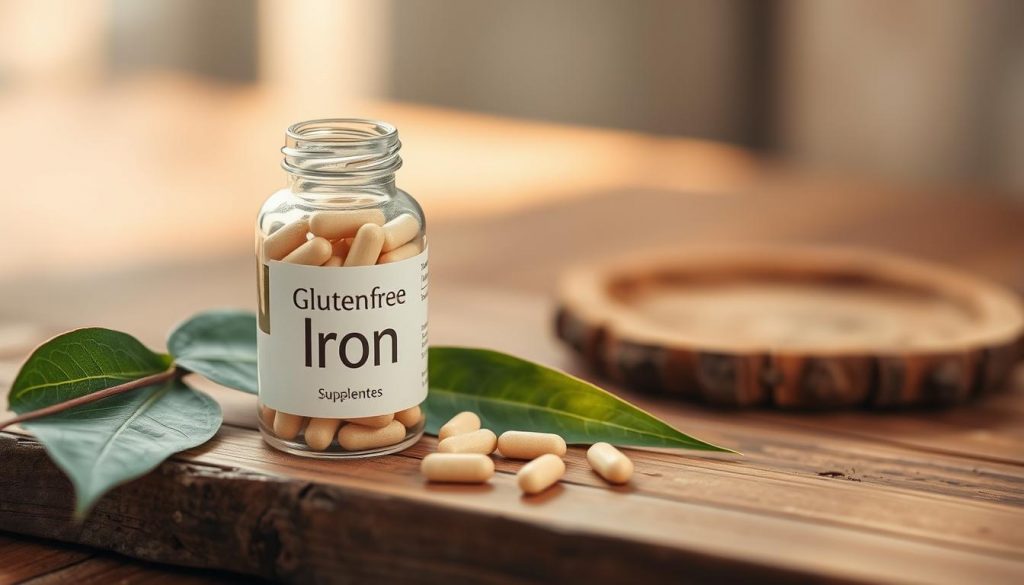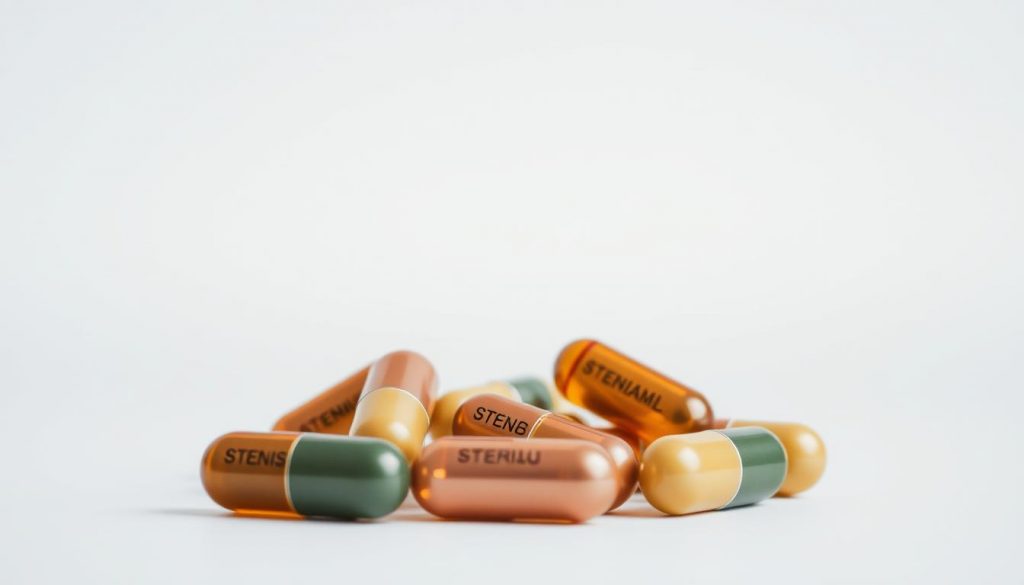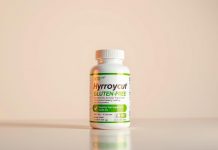Do you often feel tired and wonder if gluten-free iron pills can help? You’re not alone. Iron deficiency is common, affecting many, including those with gluten sensitivity1. There are many gluten-free iron supplements out there, making it hard to pick the right one. These supplements are made to meet dietary needs while providing essential nutrients.
When looking for gluten-free iron supplements, find ones that are easy to absorb and gentle on your stomach. Fergon Classic is a good example2. Some supplements, like Feosol Complete, mix heme and non-heme iron for better absorption and fewer side effects3.
Table of Contents
Key Takeaways
- Gluten-free iron supplements are designed for individuals with gluten sensitivity or intolerance.
- Iron deficiency is a common issue, affecting approximately 50% of anemia cases worldwide2.
- Gluten-free iron pills can help increase energy levels and reduce fatigue.
- It’s important to choose a supplement that is easy to absorb and gentle on the stomach.
- Some supplements, like Feosol Complete, do not require Vitamin C to improve iron absorption3.
- Regular use of NSAIDs like ibuprofen can lead to iron loss due to gastric or intestinal bleeding, affecting approximately 25% of regular NSAID users1.
- Iron supplements without gluten are available in various forms, including capsules and tablets.
What Are Gluten-Free Iron Pills?
Gluten-free iron pills, like gluten free iron capsules, are key for those with celiac disease or gluten sensitivity. They help fight iron deficiency anemia, a big problem for people with celiac4. Without enough iron, you might feel tired, weak, and have other health problems.
When picking a gluten-free iron supplement, look at the type of iron. Heme iron and non-heme iron are the two main types. Heme iron is better absorbed by the body4. So, the best gluten free iron pills usually have heme iron, which is great for iron deficiency.
Some people, like pregnant women or those with heavy periods, might need more iron. In these cases, gluten free iron vitamins or top gluten free iron pills can help. Always talk to a doctor to find the right treatment5.
People with celiac disease or gluten sensitivity should choose gluten-free iron supplements. This helps avoid making their condition worse. By picking the right supplement, like gluten free iron capsules, they can manage iron deficiency anemia and stay healthy6.
Benefits of Taking Gluten-Free Iron Pills
Taking gluten free iron supplements for anemia offers many benefits. It helps those with gluten intolerance or celiac disease. It boosts energy, reducing fatigue and weakness7. It also supports the immune system, which is key for health8.
Some key benefits of gluten free iron tablets include:
- Supports energy production and reduces fatigue
- Aids in immune function and overall health
- Promotes healthy blood cells and prevents anemia
Research shows that celiac disease can lead to malabsorption7. This can affect nutrient intake. So, gluten free iron supplements for anemia help ensure enough iron. For more on managing anemia with celiac disease, check out this resource.
Supports Energy Production
Non-gluten iron supplements boost energy, reducing fatigue and weakness7. This is vital for those with gluten intolerance or celiac disease. They often face malabsorption and nutrient deficiencies.
Aids in Immune Function
Gluten free iron tablets also boost the immune system8. This is critical for staying healthy and avoiding illnesses.
How Gluten-Free Iron Supplements Work
Understanding how gluten-free iron pills work is key. These supplements are made for those who can’t handle gluten. They come in different iron types, like ferrous sulfate and iron bisglycinate9.
How well your body absorbs iron depends on the type and other factors. Vitamin C, for example, can help your body take in more iron9. A gluten-free diet is important, but it can sometimes lead to iron deficiency. This is why choosing the right iron supplement is so critical.
Iron supplements can cause side effects like nausea and stomach pain9. But, with the right supplement and a gluten-free diet, you can manage your iron levels. This ensures you stay healthy and get all the nutrients you need.
Common Causes of Iron Deficiency
Iron deficiency is a common issue caused by many factors. People with celiac disease often struggle to absorb iron, leading to anemia even with a diet rich in iron10. This is because celiac disease damages the small intestine, making it hard to absorb nutrients like iron11.
Other health issues, like peptic ulcer disease, can also cause iron deficiency anemia in young males11. Women of childbearing age might also face iron deficiency anemia due to heavy menstrual bleeding10. To combat iron deficiency, taking gluten free iron capsules or vitamins is key.
Common reasons for iron deficiency include:
* Poorly planned gluten-free diets
* Health issues like celiac disease or peptic ulcers
* Heavy menstrual bleeding in women
* Gastrointestinal bleeding or blood loss
It’s vital to tackle these causes and consider gluten free iron supplements to prevent and treat iron deficiency.

| Causes of Iron Deficiency | Description |
|---|---|
| Dietary Restrictions | A gluten-free diet that is not well-planned can lead to iron deficiency |
| Health Conditions | Celiac disease, peptic ulcer disease, and other health conditions can affect iron levels |
| Heavy Menstrual Bleeding | Women of reproductive age may experience iron deficiency anemia due to heavy menstrual bleeding |
Understanding the causes of iron deficiency and taking preventive measures can help avoid anemia and related health issues. Adding gluten free iron capsules or top gluten free iron pills to your daily routine can make a big difference.
Choosing the Right Gluten-Free Iron Supplement
When picking a gluten-free iron supplement, always check the ingredient labels and look for third-party testing12. This makes sure the supplement fits your dietary needs and is safe. Some top choices include Care/of iron capsules, Persona iron capsules, and New Chapter Fermented Iron Complex12.
Think about the type of iron, how well it’s absorbed, and its bioavailability. For instance, Thorne Iron Bisglycinate has 25 mg of iron in one capsule. Nature Made Iron has 65 mg in each tablet13. Some supplements, like Garden of Life’s Vitamin Code Healthy Blood, also have extra vitamins to help with absorption and blood health13.
When picking a gluten-free iron supplement, consider these factors:
* Type of iron
* Absorption and bioavailability
* Side effects
* Price and value
Some top gluten-free iron supplements are:
* Thorne Research Iron Bisglycinate
* Nature Made Iron
* Garden of Life’s Vitamin Code Healthy Blood
These supplements are gluten-free and offer benefits like high absorption rates and extra vitamins13.
Choosing the right gluten-free iron supplement depends on your needs and preferences. Always talk to a healthcare professional before starting any new supplement, even if it’s gluten-free12.
| Supplement | Price | Iron Content |
|---|---|---|
| Thorne Research Iron Bisglycinate | $13 | 25 mg |
| Nature Made Iron | $8.68 | 65 mg |
| Garden of Life’s Vitamin Code Healthy Blood | $20 | 28.8 mg |
How to Incorporate Iron Pills into Your Routine
When taking gluten free iron pills, timing and dosage are key. Iron-deficiency anemia is common, often due to diet or blood loss. Taking best gluten free iron supplements with vitamin C can help absorption.
Adults need 18 milligrams of iron daily if they menstruate14. You can get this by eating iron-rich foods like beef and taking iron supplements without gluten. Vitamin C can boost non-heme iron absorption14.

For more on gluten free diet pills, check this website. By following dosage and timing, you can easily add gluten free iron pills to your routine. This supports your health goals.
Timing and Dosage Recommendations
- Take iron supplements with vitamin C-rich foods to enhance absorption
- Follow the recommended daily intake of 18 milligrams of iron per day
- Consult with a healthcare professional before starting any supplement regimen
Pairing with Vitamin C for Better Absorption
Pairing iron supplements without gluten with vitamin C foods boosts absorption14. This is vital for those with iron-deficiency anemia. It helps with tiredness, shortness of breath, and weakness14.
Potential Side Effects of Iron Supplements
It’s important to know about side effects when taking gluten free iron capsules or vitamins. Gastrointestinal issues like constipation, diarrhea, and nausea affect up to 20% of users15. About 2% of people taking liquid iron might have allergic reactions, but this is rare15.
Choosing top gluten free iron pills that are easy on the stomach and absorb well is key16. Always follow the dosage and talk to a doctor if you experience any side effects. Around 10% of users might notice a metallic taste in their mouth15.
Iron supplements come in different forms, like liquid ones, which might work faster15. But, it’s vital to know the risks, like iron overdose. This can be deadly for kids, with over 3,000 emergency visits in the U.S. each year15.
Knowing the possible side effects and taking precautions helps. This way, people can safely use gluten free iron capsules or vitamins. It ensures they get the nutrients they need without risking their health17.
Gluten-Free Diet and Iron Absorption
A gluten-free diet is key for better iron absorption, which helps fight iron deficiency anemia. It’s important to know how a gluten-free diet affects your iron levels. Research18 shows celiac disease often leads to iron deficiency anemia. A gluten-free diet is essential for managing this.
Following a gluten-free diet can ease symptoms of iron deficiency anemia like fatigue and weakness. Foods rich in iron, like red meat, poultry, and fish, fit well into a gluten-free diet. For instance, a pigeon has 24.3 mg of iron19 per portion, and liver has 12.5 mg19. Lentils, chickpeas, and spinach are also good sources of iron and are naturally gluten-free.
Foods Naturally High in Iron
- Red meat (beef, lamb, pork)
- Poultry (chicken, turkey)
- Fish and seafood (salmon, sardines, anchovies)
- Legumes (lentils, chickpeas, kidney beans)
- Leafy greens (spinach, kale, broccoli)
Adding these foods to your diet is a good start. You can also consider gluten-free iron tablets or supplements to boost your iron. Always talk to a healthcare professional before starting any new supplements. A gluten-free diet and the right supplements can help manage iron deficiency anemia and keep your iron levels right.
Comparing Gluten-Free Vs. Regular Iron Supplements
Choosing between gluten-free and regular iron supplements involves several factors. The nutritional profile of each is a key consideration. Gluten-free iron pills, from trusted brands, match regular supplements in nutrition but are gluten-free20. This is vital for those with celiac disease or gluten intolerance, as gluten can worsen iron deficiency.
Some find gluten-free iron supplements easier to digest than regular ones21. This might be because gluten-free options use different ingredients that are gentler on the stomach. They’re also a good choice for those who get upset stomachs from regular iron supplements.
Here are some main differences between gluten-free and regular iron supplements:
- Ingredients: Gluten-free supplements use ingredients like rice flour or cornstarch instead of wheat or barley20.
- Absorption and bioavailability: Gluten-free supplements may have similar absorption and bioavailability rates as regular ones21.
- Side effects: Gluten-free supplements might cause fewer side effects, like stomach upset or diarrhea, compared to regular ones20.
The choice between gluten-free and regular iron supplements depends on personal needs and preferences. If you’re looking for a gluten-free option, consider reputable brands’ best gluten-free iron supplements21. Always talk to a healthcare professional before starting any new supplement, including those without gluten.
Customer Reviews and Testimonials
Choosing a reliable gluten-free iron supplement can be tough. But, customer reviews and testimonials can help a lot22. Fergon Classic is a top choice, known for helping users with iron deficiency22. People say it boosts energy, strengthens the immune system, and improves blood cells22.
Looking for gluten-free iron capsules and vitamins? Check out the top ones with good reviews23. Fergon Classic, with its ferritin iron, is often praised for its effectiveness24.
Before starting any supplement, talk to a healthcare professional24. They can guide you on the right dosage for your needs. Choosing a well-reviewed brand is a great first step towards better health and energy.
FAQ
What are gluten-free iron pills and why are they important?
Who needs iron supplements and why?
What are the benefits of taking gluten-free iron pills?
How do gluten-free iron supplements work?
What are the common causes of iron deficiency?
How do I choose the right gluten-free iron supplement?
How do I incorporate iron pills into my routine?
What are the possible side effects of iron supplements?
How does a gluten-free diet affect iron absorption, and what are some strategies for increasing iron intake?
How do gluten-free iron supplements compare to regular iron supplements?
What are the customer reviews and testimonials for gluten-free iron supplements?
Source Links
- Ultra Iron — Gluten-Free Nutritional Supplement – Gluten Free Society – https://www.glutenfreesociety.org/product/ultra-iron-gluten-free-nutritional-supplement/?srsltid=AfmBOoot0U1JzJsSJS7Oc8r8jKpl1vRbg3XnNkLAvd5OKKOsXcXaJORy
- Fergon® Iron Restore™ – https://fergon.com/
- Feosol Complete – https://feosol.com/products/feosol-complete?srsltid=AfmBOoq3O70Oh7FQJJiB3J3A9pcDTcAjjqfBuwJDW8ZHOEFIc1bY2bVR
- Gluten Free Iron Tablets – Active Iron Supplements – Active Iron – https://www.activeiron.com/us/blog/gluten-free-iron-tablets-active-iron-supplements/
- Women’s Health & Celiac Disease | Celiac Disease Foundation – https://celiac.org/2015/02/25/womens-health-celiac-disease/
- Iron Deficiency Anemia & Celiac Disease: How to Choose the Right Iron – https://www.ferosomcanada.com/blogs/news/iron-deficiency-anemia-celiac-disease-how-to-choose-the-right-iron-supplement?srsltid=AfmBOoqxDXIzYqC1t1B7Gc0maiFx5QCC7DOQmRWqy_FFifDzqiocvenn
- Supplements for Those With Gluten Intolerance – https://www.verywellhealth.com/nutrients-to-boost-if-youre-gluten-free-563076
- Micronutrients Dietary Supplementation Advices for Celiac Patients on Long-Term Gluten-Free Diet with Good Compliance: A Review – https://pmc.ncbi.nlm.nih.gov/articles/PMC6681258/
- Iron – https://www.coeliac.org.uk/information-and-support/your-gluten-free-hub/home-of-gluten-free-recipes/healthy-eating/iron/
- Why Celiac Disease Often Leads to Iron Deficiency Anemia – Allied Digestive Health – https://allieddigestivehealth.com/why-celiac-disease-often-leads-to-iron-deficiency-anemia/
- Iron deficiency anemia in celiac disease – https://pmc.ncbi.nlm.nih.gov/articles/PMC4541375/
- 9 Best Iron Supplements in 2024 – https://www.medicalnewstoday.com/articles/best-iron-supplement
- The Best Iron Supplements That Are Gentle on Your Stomach, According to Nutritionists – https://www.goodhousekeeping.com/health-products/g44496675/best-iron-supplements/
- 7-Day Anemia Diet Plan to Help Boost Iron Levels, Created by a Dietitian – https://www.eatingwell.com/article/7921908/anemia-diet-plan-to-help-boost-iron-levels/
- Are There Any Side Effects of Taking Liquid Iron Daily? – https://greenpeach.com/blogs/supplements-nutrition/are-there-any-side-effects-of-taking-liquid-iron-daily?srsltid=AfmBOorXgY8HU1Q682muckS7nvz2t6UYpspXrJsh-viujk_SpShFZ7jv
- Celiac Disease and Anemia – GIG® Gluten Intolerance Group® – https://gluten.org/2019/10/17/celiac-disease-and-anemia/
- The Health Benefits of Chelated Iron – https://www.verywellhealth.com/chelated-iron-benefits-4684057
- Why Celiac Disease Often Leads to Iron Deficiency Anemia – Riverdale Gastroenterology & Liver Disease – https://riverdalegastro.com/why-celiac-disease-often-leads-to-iron-deficiency-anemia-2/
- Iron and coeliac disease – https://www.cuh.nhs.uk/patient-information/iron-and-coeliac-disease/
- Feralgine™ a New Approach for Iron Deficiency Anemia in Celiac Patients – https://pmc.ncbi.nlm.nih.gov/articles/PMC6520849/
- A new innovation in iron supplementation targeted at celiac disease sufferers – https://www.nutraingredients.com/News/Promotional-features/Iron-supplementation-with-high-tolerability-for-celiac-disease/
- Iron Supplements Review & Top Picks – ConsumerLab.com – https://www.consumerlab.com/reviews/iron-supplements-review/iron/
- Iron 45 mg + Vitamin C Chewable Tablets, Grape – https://celebratevitamins.com/products/iron-45mg-chewable-tablets-grape?srsltid=AfmBOoqsMJOg_vBpLXEfXQXJuvfkXcom_a-GG8AsfHFthAdnbTMs9q5C
- Ferritin+ | Plant Based Ferritin Iron | Slow Release Iron Capsules – https://ca-en.florahealth.com/products/ferritin?srsltid=AfmBOorwUUNFstXN0TbqK8D1gzR2Vxk2pjHKuczISKu7b3CSXMAchPrl












